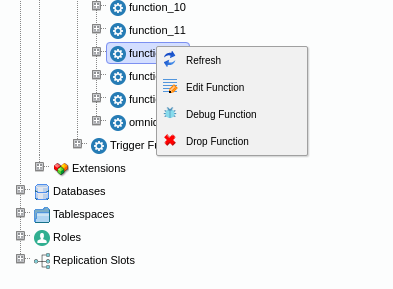OmniDB – Now with PL/pgSQL debugger!
OmniDB’s 2.3.0 release, which is coming out on November 2nd, comes with a much requested feature: a debugger for PL/pgSQL functions. This post will walk you through the steps to start debugging your functions inside OmniDB.
1. Requirements
The debugger takes advantage of hooks, an extensibility in PostgreSQL’s source code that allows us to perform custom actions when specific actions are performed in the database. For the debugger we use hooks that are triggered when PL/pgSQL functions are called, and each statement is executed.
This requires the user to install a binary library and enable it in PostgreSQL’s config file.
The debugger also uses a special schema with special tables to control the whole debugging process. This can be manually created or with an extension.
2. Debugging Interface
The debugging process is very straightforward, if OmniDB detects that the current database contains the ‘omnidb’ schema, it will enable the action ‘Debug Function’ in the function context menu:
The debugging interface is composed of an SQL editor that will show the process step by step on top of the function source code, and 5 tabs to manage and view different parts of the debugger.
2.1. Parameters
Before the debugging process starts, the user must provide all the parameters in this tab.
The parameters must be provided exactly the same way you would provide them if you were executing the function yourself, quoting strings for instance.
2.2. Variables
This grid displays the current value of each variable that exists in the current execution context, it will be updated with every step.
2.3. Result
When the function ends, this tab will show the result of the function call. It could be empty or even just a set of rows.
2.4. Messages
Messages returned explicitly by RAISE commands or even automatic messages from PostgreSQL will be presented in this tab.
2.5. Statistics
At the end of the debugging process, a chart depicting execution times for each line in the function body will be presented in this tab. Additionally, the SQL editor will be updated with a set of colors representing a heat map, from blue to red, according to the max duration of each line.
2.6. Breakpoint
The interface enables the user to add one breakpoint to any line. This breakpoint is created by clicking in the row header (the line number) in the SQL editor. The breakpoint can be changed at any time when there isn’t a step in progress.
2.7. Actions
The current version of the debbuger allows the user to step over to next statement and resume execution, which will stop in the next breakpoint or continue until the end of the function.
3. Debugging Example
Let’s debug a simple function that receives a string and returns another string, adding a white space between each character from the original.
Adjust the parameter and click in the start button.
We are at the beginning of the debugging process, the current line number is 8 and the variables didn’t receive any value yet. The debugger can be stopped at any time by clicking in the Cancel button.
Let’s add a breakpoint in line 16 and resume execution, OmniDB’s interface will regain control over the debugging operation as soon as all statements before the breakpoint are completed.
Let’s resume again, the process will reach the end of the function and display results.
As can be seen in the chart and in the editor, the line 16 took most of the time.
4. Performance
The debugging process in PostgreSQL is only executed if a special flag is activated by OmniDB. Other function calls will execute normally after checking that the flag is false. Tests show that this check does not affect performance.
5. Roadmap
Future releases will include additional features in the debugging process:
- Step Into
- Multiple breakpoints
- Call stack
- Call graph
Stay tuned for more!










Leave a Reply
Want to join the discussion?Feel free to contribute!